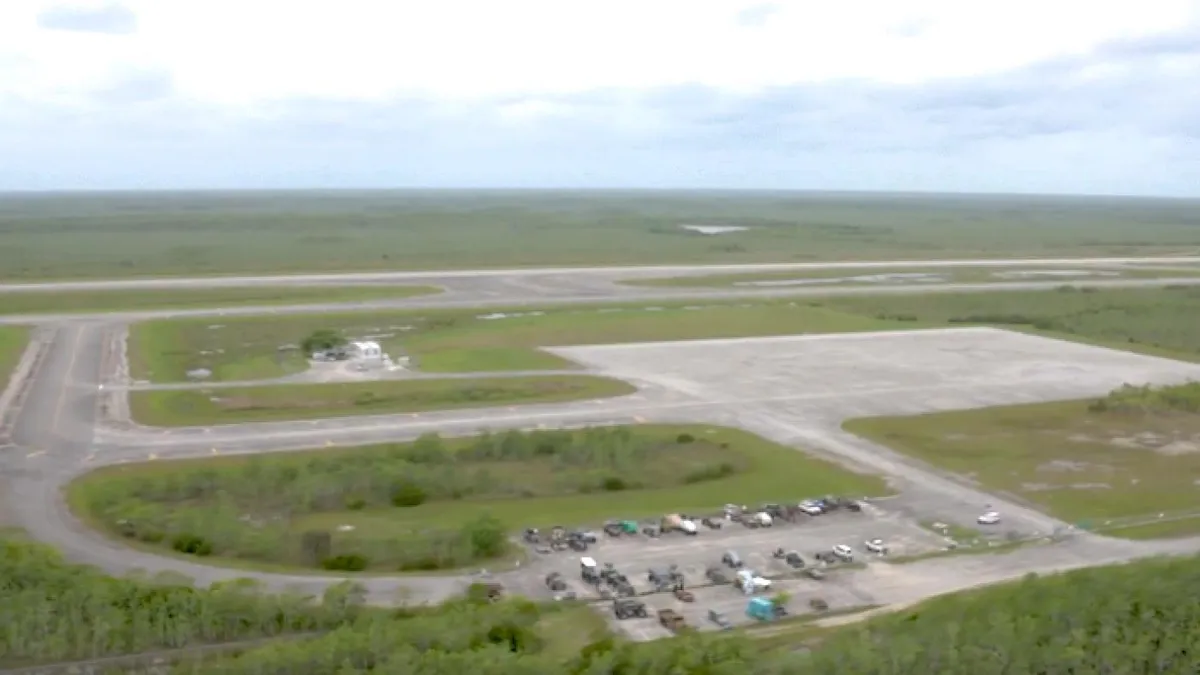
Florida officials are making headlines as they plan to transform an airfield in the Everglades into a migrant detention center, dubbed Alligator Alcatraz due to its close proximity to alligators and other wildlife. This initiative, proposed by Florida Attorney General James Uthmeier, aims to support the Trump administration's stringent approach to illegal immigration. In a recent video posted on X, Uthmeier stated that Florida Governor Ron DeSantis has directed state leaders to locate sites for temporary detention facilities. Uthmeier referred to this location as "the best one," likening it to the notorious prison island in San Francisco Bay.
The proposed detention center will be situated at the Dade-Collier Training and Transition Airport, located along the eastern boundary of the Big Cypress National Preserve, approximately 55 miles west of Miami. Initially envisioned to become the Everglades Jetport—projected to be the largest airport globally—the development was halted in the 1970s due to environmental concerns. Currently, the airport's 10,500-foot long runway is mainly used for precision-instrument landing and training, as reported by Miami International Airport. Uthmeier described the site as largely abandoned and received swift approval for his plans.
According to Uthmeier, the federal government approved the plan for Alligator Alcatraz, setting the stage for the facility to potentially open in early July. The detention center is slated to accommodate 5,000 migrants—half of its total capacity—by that time. The Department of Homeland Security (DHS) has indicated that the facility will expand in the coming days through a collaborative effort with Florida.
However, the plan has not been welcomed by everyone. Environmental organizations and immigration advocates have voiced significant concerns regarding the implications of this project. They highlight potential risks to the fragile Everglades ecosystem and the welfare of detainees, especially during the oppressive summer heat. On Sunday, several hundred community members protested outside the property gates, emphasizing the land's cultural importance to Native Americans and its value to conservationists, as reported by WGCU.
In response to these concerns, Miami-Dade Mayor Daniella Levine Cava urged the Florida Division of Emergency Management to slow down the project and provide more information, particularly regarding the environmental ramifications. In her letter, she stressed the need for thorough review and due diligence before proceeding with actions that could have long-term effects on the community, as reported by WLRN.
When approached about the growing concerns surrounding Alligator Alcatraz, the DHS referred to a statement by Homeland Security Secretary Kristi Noem, asserting that under the Trump administration, efforts are being made to deliver on the American mandate for mass deportations of individuals engaged in illegal activities. Uthmeier explained on The Benny Show that the facility will detain migrants apprehended in Florida and across the nation, with the capability to accommodate large aircraft. He indicated that the setup will primarily consist of temporary tent and trailer facilities.
Concerning financing, Noem indicated that the project would be primarily funded through FEMA's Shelter and Services Program, designed to support communities sheltering migrants awaiting court hearings. The estimated cost for running the facility for one year is around $450 million, with the Florida government negotiating to purchase the land for $20 million.
The Dade-Collier Airport is situated within the Everglades, a unique subtropical wetland ecosystem spanning two million acres in central and south Florida. This area is vital for the state's irrigation and drinking water systems, as well as its rich wildlife, which includes hundreds of bird species, alligators, panthers, and manatees. Ongoing urban development, climate change, and invasive species have already threatened the health and size of the Everglades, fueling a movement for its protection.
One organization, Friends of the Everglades, is actively campaigning against the Alligator Alcatraz project, arguing that the land is part of one of the nation's most fragile ecosystems and deserves long-term protection. Conservationists are rallying for Floridians to unite against the detention center, echoing the successful campaign to halt the Everglades Jetport's development decades ago.
As discussions continue, the future of Alligator Alcatraz remains uncertain, with strong community opposition and environmental concerns at the forefront of the debate.